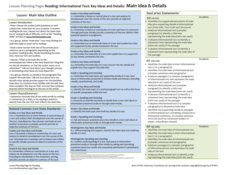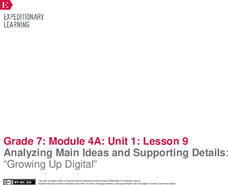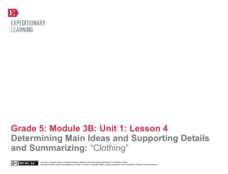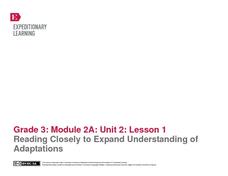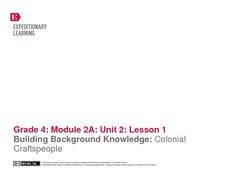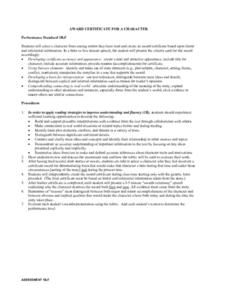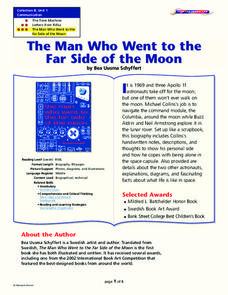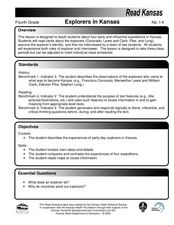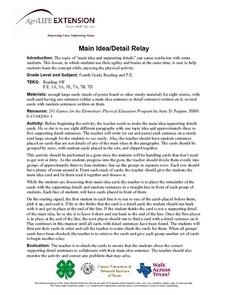Pearson
Main Idea
The main idea of this resource is that you should take a look if you're planning to teach main ideas in your class! Cover just about everything you need to know about main ideas with a packet of materials that includes information and...
EngageNY
Analyzing Main Ideas and Details: Why Care about Water?
Pay attention to details! After completing text-dependent questions about paragraphs 10-12 of "Water is Life," scholars view the video "Why Care about Water. "They view the video three times and use a Main Idea and Details note-catcher...
For the Teachers
Main Idea Outline
Find the main idea in an informational text with a versatile lesson plan. Three levels of differentiation help you implement the strategy in any age or class level, based on the ability and objectives of your learners.
DePaul University
The Working Tools of Insects
The animal kingdom is full of interesting organisms that have unique ways of surviving. Children read about different insects that have special tools for building homes and protecting themselves. When finished, learners identify the main...
Polk Bros Foundation
How to Summarize a Non-Fiction Passage
After reading a text, one way to find out how much your class comprehended is to ask your pupils to summarize. This worksheet helps class members prepare for writing a summary of a nonfiction text. They note down the topic, up to eight...
EngageNY
Synthesizing from Informational Texts: Main Idea and Key Details from Promises to Keep (Pages 8– 10)
Learners determine the main idea of a timeline on pages eight and nine of the text Promises to Keep. They use the timeline to complete a Main Idea and Details note catcher and then share their thoughts with the class. To finish,...
EngageNY
Analyzing Main Ideas and Supporting Details: “Growing Up Digital”
Young scholars continue their exploration of adolescent brain development by reading an informational text, "Growing Up Digital," by Matt Richtel. Then, with partners, they complete note-catcher worksheets to capture the article's main...
EngageNY
Determining Main Ideas and Supporting Details and Summarizing: “Clothing”
Surviving winter. Pupils begin reading on page 18 of The Inuit Thought of It: Amazing Arctic Inventions and sketch how the people used animal skin clothing to survive the winter. Readers complete a main idea graphic organizer...
Ed Helper Clip Art
Main Idea Three Ideas and Details
Readers organize and display three ideas that support a topic, as well as two details that support each idea.
Curated OER
Finding the Main Idea: The Storm
Readers analyze a brief excerpt describing a storm, then choose the most applicable from four main ideas. They jot down three details from the story in three boxes. The excerpt isn't anything special; however, for a quick practice with...
EngageNY
Reading Closely to Expand Understanding of Adaptations
Third graders work to determine the main idea, recall key details, and answer questions using an informational text on the topic of animal adaptations. Using the non-fiction text "Staying Alive: Animal Adaptations" (provided) the teacher...
EngageNY
Mid-Unit Assessment: Close Reading of Bullfrog at Magnolia Circle: Bullfrog Life Cycle
The sixth lesson plan in this Bullfrog at Magnolia Circle unit assesses your third graders' ability to read and understand informational text. The included assessment asks learners to take notes about the main idea and supporting...
EngageNY
Building Background Knowledge: Colonial Craftspeople
In the first lesson plan of this unit on colonial trade, fourth graders gain background knowledge of different jobs performed by early colonists. The class begins with a slide show presentation that includes a variety of great...
Curated OER
AWARD CERTIFICATE FOR A CHARACTER
Connect to real-world experiences by having your primary learners create an award certificate based upon literal and inferential information from a story. They present the award to a character from a story and explain the criteria used....
Curated OER
The Man Who Went to the Far Side of the Moon
Practice comprehension skills using the story, The Man Who Went to the Far Side of the Moon by Bea Uusma Schyffert. Learners answer questions, fill out graphic organizers, and engage in extension activities involving writing and...
EngageNY
Continued Close Reading of Bullfrog at Magnolia Circle: Text-Dependent Questions and Vivid Words and Phrases
In the third activity from this unit based on the book Bullfrog at Magnolia Circle, learners focus on using specific details from the text-to-answer questions about the habitat of bullfrogs. While reading the text, young...
Curated OER
Juan Verdades
Cement comprehension skills using the strategies in this activity. After reading the story, Juan Verdades by Joe Hays, learners use context clues to answer questions, identify main ideas and details, and sequence events.
Curated OER
Explorers in Kansas
Fourth graders read cards about the explorers: Coronado, Lewis, and Clark, Pike, and Long. In this influential expeditions instructional activity, 4th graders describe and observe explorers who came to Kansas. Students locate main...
Curated OER
The Mitten
Explore the Ukraine through a reading of The Mitten. Readers will determine the sequence of events, cause and effect, make predictions, and find the main idea of the story. They also use math skills to make charts and graphs. Finally,...
Curated OER
Identifying Main Idea and Supporting Details - The Stonecutter's Wish
Students identify details that support the theme of a story. For this main idea or theme lesson, students view a video of "The Stonecutter's Wish." Students are given a graphic organizer to use as they discuss the main idea...
Curated OER
Lesson 1:Using Headings to Determine the Main Idea (nonfiction)
Sometimes all you need is a good heading to determine the main idea in a block of text. Young readers learn how to use headings to guild them to determining the main idea. They practice as a class, in pairs, and then on their own. The...
Curated OER
Using Details To Create a Title
Young scholars read a book about leopards and create a title based on the details they read about the book. In this titles lesson plan, students read the book In the Wild: Leopards with the title covered up.
Curated OER
Introduce: Summarizing Narrative Text
When scholars re-tell a story, do they boil it down to important details in a logical order? Practice summarizing narratives using this think-aloud strategy, which is scripted here for your convenience. After explaining why this is an...
Curated OER
Main Idea/Detail Relay
Fourth graders discuss the difference between main ideas and supporting details. They use large placement cards made by the teacher with main idea and supporting detail statements on them to practice.
Other popular searches
- Details and Main Ideas
- Finding Main Idea Details
- Identify Main Idea and Details
- Topic Main Ideas Details
- Details Supporting Main Idea
- Main Idea Details Passage
- Details Main Idea
- Main Idea Details Test
- Topic Main Idea Details
- Topic Main Idea and Details
- Main Idea Details Newpaper
- Main Idea Details New Paper


